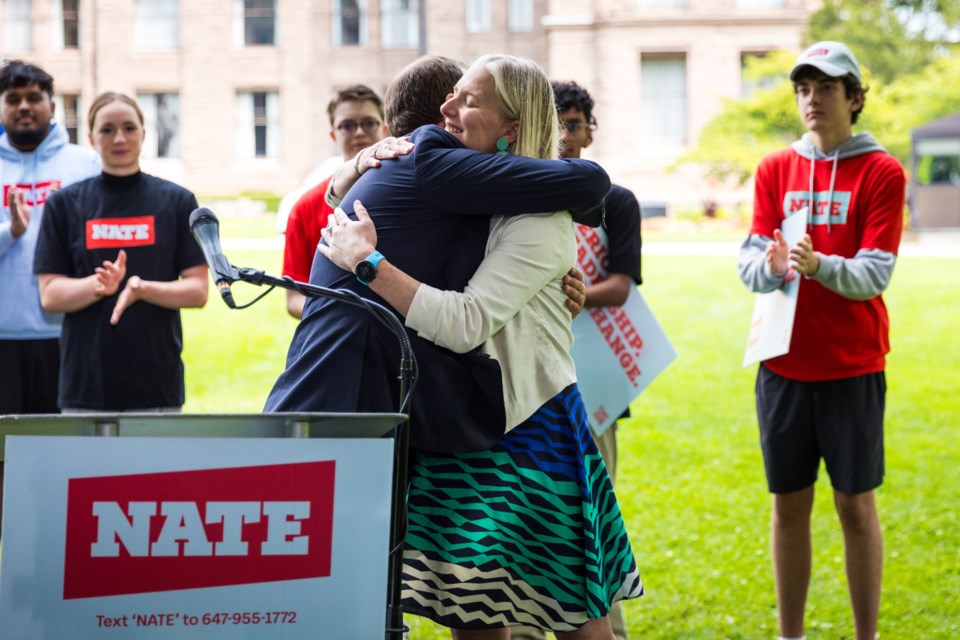Ontario Liberal leadership candidate Nate Erskine-Smith is using the "T" word.
In an economic plan, obtained in advance of its public release by The Trillium, Erskine-Smith is proposing creating "a commission to examine tax fairness and productivity, with a particular emphasis on wealth inequality."
"The commission will consider a range of potential revenue sources, including a financial transactions tax and progressive taxation of extremely wealthy estates," his plan says.
Erskine-Smith told The Trillium that the goal of the commission would be to recommend tax changes within provincial jurisdiction that address wealth inequality — that do not further tax low- and middle-income families — and that do not harm the province's lagging productivity. A new tax would have to raise a significant amount of revenue that "can be put to productive sources, and that will serve the public interest and serve people in need."
"It's a conversation worth having," he said. "If we could impose progressive taxation on extremely wealthy estates and use that revenue to increase (the Ontario Disability Support Program) ODSP and lift people out of poverty in the greatest need, or society would be much better for it."
The commission wouldn't have to recommend the two taxes his plan floats — on wealthy estates and a financial transactions tax, something U.S. Democrats have proposed and some European countries have adopted. Erskine-Smith said its value is as "an opportunity to generate revenue from an activity that isn't a productive activity in our economy."
There are taxes Erskine-Smith wouldn't endorse, including Toronto's request for a municipal sales tax.
"I've said flatly, no, because it's regressive," he said. "It's unfair for low-income and middle-income workers, absent a rebate, and the city's not well placed to administratively deliver a rebate like that. And so that's not a conversation that we should be having at the municipal level."
To implement any tax changes, Erskine-Smith would have to win the Ontario Liberal Party leadership election — and then win an election, almost certainly against a premier who'd rail against any plan to raise taxes.
"I have no interest in taxing low and middle-income families in this province — I do think wealth inequality should be on the agenda," he said, offering the argument he'd use against the PCs. "And if Doug Ford wants to defend against any conversation about wealth inequality, then he can have that because, you know, he has a track record at this point. Far from being for the people, he's been in it for his friends and as well wealthy friends. If he wants to double down on that and avoid any conversation about wealth inequality in the province of Ontario, then I'd be happy to have that debate."
Erskine-Smith drew on his experience with Trudeau Liberals, running and winning as a first-time candidate on hiking taxes on the rich, to argue that running on potential tax increases is politically viable.
"Did Harper clobber us when we taxed the one per cent?" he said, and added that, as an MP, he proposed a one-time wealth tax in a private member's bill and said he got support from Conservatives the for the idea.
The tax fairness commission is only one part of Erskine-Smith's economic plan. Other planks include:
- Designing long-term regional transit action plans
- Supporting transit operations, maintenance, and improving service quality through increased provincial funding and consideration of new revenue tools
- Restructuring Metrolinx to integrate transit and housing strategies
- Investing in clean energy generation, transmission, and distribution
- Leveraging Ontario’s position as a global financial services hub and exploring ways to maximize the role that public pension plans play in building Ontario’s infrastructure, learning lessons from Quebec
- Expanding Ontario’s Digital ID adoption and use
- Recognizing credentials as-of-right from other provinces and select countries
- Implementing a suite of consumer-protection measures, including cracking down on "subscription traps" and 'increasing transparency for consumers, including by tackling new deceptive practices like 'dark patterns' that trick or manipulate consumers'
You can read the full plan here.




